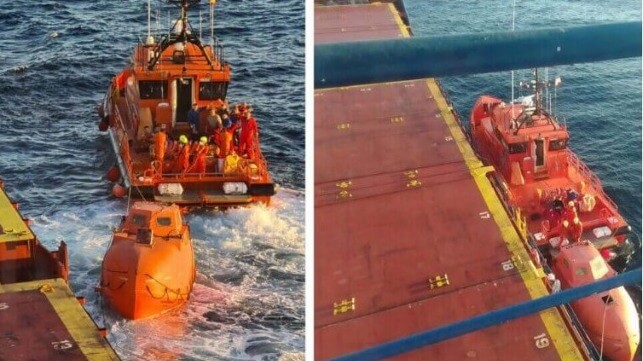Oslo Bulk Refutes Russia’s Claims It Refused Aid to Crew of Ursa Major
Claims and Controversies Surrounding Ursa Major Sinking

The sinking of the cargo ship Ursa Major off the coast of Spain has sparked a flurry of accusations and counterclaims from Russian authorities. Initially labeled as an act of terrorism, the narrative has since expanded to include allegations against a Norwegian vessel, the Oslo Carrier 3. Russian officials, including former Prime Minister Dmitry Medvedev, have linked the incident to a broader conspiracy involving Western nations and ongoing “Russophobia.” This article delves into the unfolding situation, examining the claims made by both sides and the implications of this maritime incident.
Accusations of Terrorism and International Violations
Russian authorities have made serious allegations regarding the sinking of the Ursa Major. The ship’s operator, Oboronlogistics, reported that three explosions occurred on board, labeling the incident as terrorism. They have since accused the nearby Norwegian-flagged cargo ship, Oslo Carrier 3, of failing to assist the crew of the Ursa Major during the emergency. According to Oboronlogistics, the Norwegian vessel refused to take on board the Russian sailors who were in distress, citing a ban on accepting Russian crew members. This refusal has been described as a “gross violation” of international maritime conventions.
Dmitry Medvedev, a prominent critic of the West, took to social media to express outrage over the situation. He questioned the Norwegian ship’s actions, stating, “Why so harshly? How else, given such facts?” He emphasized that the refusal to assist the drowning sailors could not be forgiven. Meanwhile, a Kremlin spokesperson echoed these sentiments, condemning the actions if they indeed violated maritime laws. This rhetoric highlights the escalating tensions between Russia and Western nations, as the incident is framed within the context of broader geopolitical conflicts.
Sanctioned Russian Ship Was Sunk By “Terrorist Attack,” Owner Claims
Counterclaims and Rescue Operations
In response to the accusations, Oslo Bulk, the operator of the Oslo Carrier 3, has firmly denied any wrongdoing. The company provided evidence, including photographs from the rescue operation, to support its claims. They stated that the Maritime Rescue Coordinating Center in Cartagena, Spain, was responsible for the rescue efforts. According to Oslo Bulk, the center instructed the Oslo Carrier 3 not to take the survivors aboard, as a dedicated rescue vessel was already en route to the scene.
Oslo Bulk clarified that the lifeboat carrying 14 survivors from the Ursa Major was secured alongside the Oslo Carrier 3 during the operation. The crew was safely transferred to the Salvamento Marítimo vessel, which then transported them to shore. The company emphasized that the crew members were not in immediate danger once they boarded the lifeboat, noting that the weather conditions were favorable and no injuries were reported.
Salvamento Marítimo, the Spanish maritime rescue service, confirmed that they dispatched two rescue boats and a helicopter upon receiving the distress call. The Ursa Major sank approximately 67 miles from the Spanish coast, and while two crew members remain missing, search efforts continue. A Spanish aircraft has been spotted circling the area, underscoring the ongoing commitment to locate the missing individuals.
As the situation develops, the contrasting narratives from Russian authorities and the Norwegian ship’s operators highlight the complexities of maritime law and international relations. The incident serves as a reminder of the potential for misunderstandings and accusations in times of crisis.
